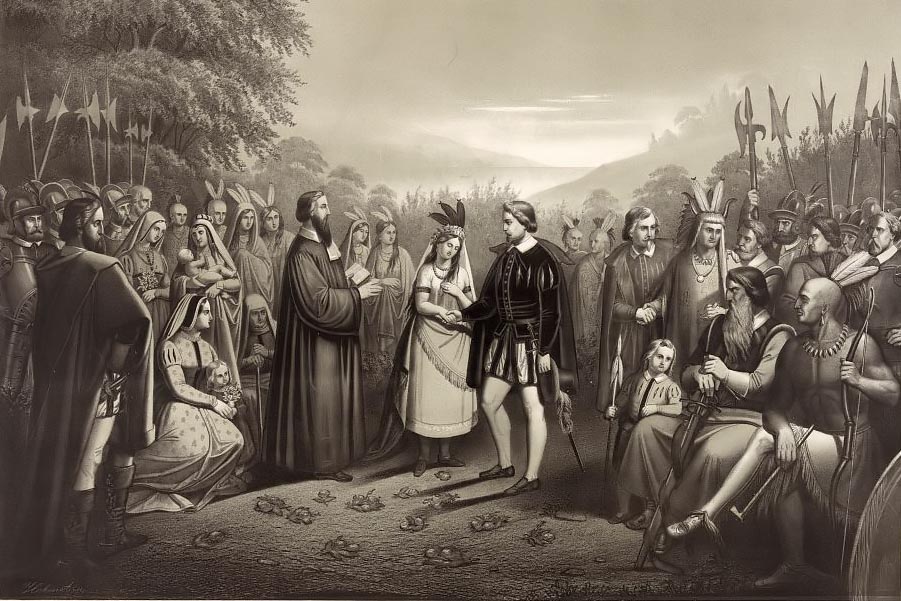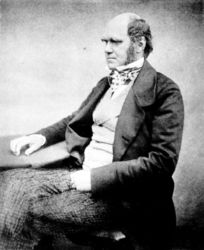-
Senior Member

Apr 5, 1614:
Pocahontas marries John Rolfe
Pocahontas, daughter of the chief of the Powhatan Indian confederacy, marries English tobacco planter John Rolfe in Jamestown, Virginia. The marriage ensured peace between the Jamestown settlers and the Powhatan Indians for several years.
In May 1607, about 100 English colonists settled along the James River in Virginia to found Jamestown, the first permanent English settlement in America. The settlers fared badly because of famine, disease, and Indian attacks, but were aided by 27-year-old English adventurer John Smith, who directed survival efforts and mapped the area. While exploring the Chickahominy River in December 1607, Smith and two colonists were captured by Powhatan warriors. At the time, the Powhatan confederacy consisted of around 30 Tidewater-area tribes led by Chief Wahunsonacock, known as Chief Powhatan to the English. Smith's companions were killed, but he was spared and released, (according to a 1624 account by Smith) because of the dramatic intercession of Pocahontas, Chief Powhatan's 13-year-old daughter. Her real name was Matoaka, and Pocahontas was a pet name that has been translated variously as "playful one" and "my favorite daughter."
In 1608, Smith became president of the Jamestown colony, but the settlement continued to suffer. An accidental fire destroyed much of the town, and hunger, disease, and Indian attacks continued. During this time, Pocahontas often came to Jamestown as an emissary of her father, sometimes bearing gifts of food to help the hard-pressed settlers. She befriended the settlers and became acquainted with English ways. In 1609, Smith was injured from a fire in his gunpowder bag and was forced to return to England.
After Smith's departure, relations with the Powhatan deteriorated and many settlers died from famine and disease in the winter of 1609-10. Jamestown was about to be abandoned by its inhabitants when Baron De La Warr (also known as Delaware) arrived in June 1610 with new supplies and rebuilt the settlement--the Delaware River and the colony of Delaware were later named after him. John Rolfe also arrived in Jamestown in 1610 and two years later cultivated the first tobacco there, introducing a successful source of livelihood that would have far-reaching importance for Virginia.
In the spring of 1613, English Captain Samuel Argall took Pocahontas hostage, hoping to use her to negotiate a permanent peace with her father. Brought to Jamestown, she was put under the custody of Sir Thomas Gates, the marshal of Virginia. Gates treated her as a guest rather than a prisoner and encouraged her to learn English customs. She converted to Christianity and was baptized Lady Rebecca. Powhatan eventually agreed to the terms for her release, but by then she had fallen in love with John Rolfe, who was about 10 years her senior. On April 5, 1614, Pocahontas and John Rolfe married with the blessing of Chief Powhatan and the governor of Virginia.
Their marriage brought a peace between the English colonists and the Powhatans, and in 1615 Pocahontas gave birth to their first child, Thomas. In 1616, the couple sailed to England. The so-called Indian Princess proved popular with the English gentry, and she was presented at the court of King James I. In March 1617, Pocahontas and Rolfe prepared to sail back to Virginia. However, the day before they were to leave, Pocahontas died, probably of smallpox, and was buried at the parish church of St. George in Gravesend, England.
John Rolfe returned to Virginia and was killed in an Indian massacre in 1622. After an education in England, their son Thomas Rolfe returned to Virginia and became a prominent citizen. John Smith returned to the New World in 1614 to explore the New England coast. On another voyage of exploration in 1614, he was captured by pirates but escaped after three months of captivity. He then returned to England, where he died in 1631.

Apr 5, 1859:
Darwin sends first three chapters of The Origin of Species to his publisher
Naturalist Charles Darwin sends his publishers the first three chapters of Origin of Species, which will become one of the most influential books ever published.
Knowing the fates of scientists who had published radical theories and been ostracized or worse, Darwin held off publishing his theory of natural selection for years. He secretly developed his theory during two decades of surreptitious research following his return from a five-year voyage to South America on the HMS Beagle as the ship's unpaid botanist.
Darwin, the privileged and well-connected son of a successful English doctor, had been interested in botany and natural sciences since his boyhood, despite the discouragement of his early teachers. At Cambridge, he found professors and scientists with similar interests and with their help began participating in scientific voyages, including the HMS Beagle's trip. By the time Darwin returned, he had developed an outstanding reputation as a field researcher and scientific writer, based on his many papers and letters dispatched from South America and the Galapagos Islands, which were read at meetings of prominent scientific societies in London.
Darwin began publishing studies of zoology and geology as soon as he returned from his voyage, while secretly working on his radical theory of evolution. Meanwhile, he married and had seven children. He finally published The Origin of Species after another scientist began publishing papers with similar ideas. When the book appeared in November 1859, it sold out immediately. By 1872, six editions had been published. It laid the groundwork for modern botany, cellular biology, and genetics. Darwin died in 1882.

Also on This Day
Lead Story
Pocahontas marries John Rolfe, 1614
American Revolution
Benjamin Franklin publishes "An Open Letter to Lord North", 1774
Automotive
NASCAR legend Lee Petty dies, 2000
Civil War
Siege of Yorktown begins, 1862
Cold War
Rosenbergs sentenced to death for spying, 1951
Crime
Kurt Cobain commits suicide, 1994
Disaster
Tornadoes devastate Tupelo and Gainesville, 1936
General Interest
Rosenbergs sentenced to die, 1951
Winston Churchill resigns, 1955
Abortion rights advocates march on Washington, 1992
Hollywood
Charlton Heston dies, 2008
Literary
Darwin sends first three chapters of The Origin of Species to his publisher, 1859
Music
James Brown calms Boston following the King assassination, 1968
Old West
Howard Hughes dies, 1976
Presidential
Washington exercises first presidential veto, 1792
Sports
Abdul-Jabbar breaks points record, 1984
Vietnam War
Antiwar demonstrations held across United States, 1969
North Vietnamese launch second front of Nguyen Hue Offensive, 1972
World War I
First stage of German spring offensive ends, 1918
World War II
Tito signs "friendship treaty" with Soviet Union, 1945
More on: This Day in History from History Channel

 Posting Permissions
Posting Permissions
- You may not post new threads
- You may not post replies
- You may not post attachments
- You may not edit your posts
-
Forum Rules









 Reply With Quote
Reply With Quote